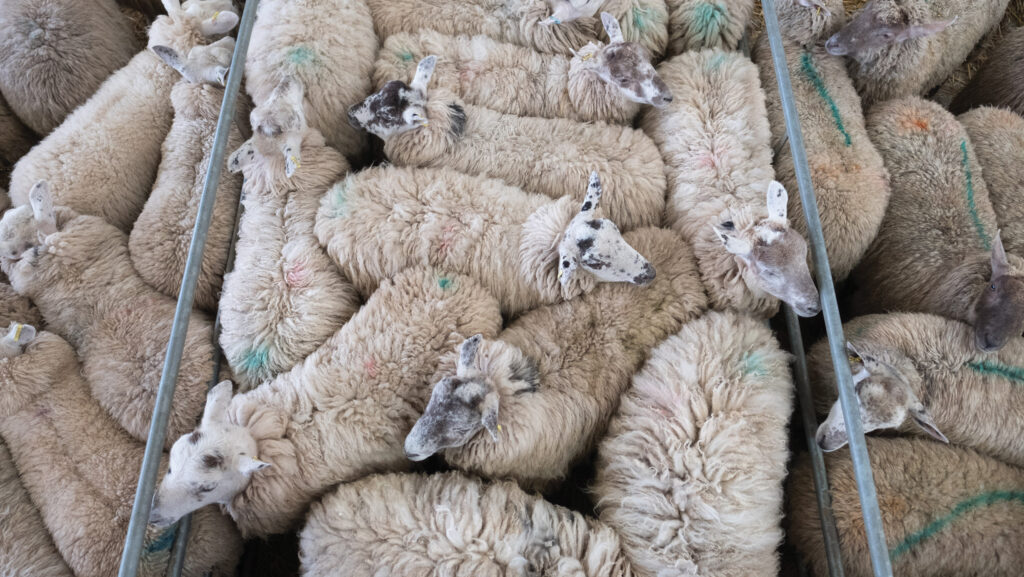Welsh farmers losing money with ‘out of spec’ carcasses
 © Tim Scrivener
© Tim Scrivener Hundreds of sheep farmers are failing to maximise potential returns for their lambs, with some losing as much as 65p/kg deadweight in price penalties and lost premiums.
Welsh red meat levy body Hybu Cig Cymru – Meat Promotion Wales (HCC) says information collected at British abattoirs in 2023 showed that only 58% of lambs processed achieved the target grades.
See also: FW guide to selecting lambs for slaughter
Ahead of this month’s Royal Welsh Show (22-25 July), where representatives from HCC and major meat buyers will be on hand to give advice, the organisation said the data showed there was “considerable room” for more production efficiencies to boost farm returns.
Processors typically pay 15-20p/kg deadweight above the base price set on the day when a carcass moves one level up the target R conformation grade on the Europ classification grid.
This means the difference between an R and E grade could be 30-40p/kg deadweight.
But if they fail to stay in the required fat category, penalties are imposed. This is where lamb producers struggled last year, amid poor weather and high feed prices at finishing.
For some, the combination of failing on conformation and fat requirements cost 65p/kg deadweight.
Knowledge gap
Although some lamb producers are getting better at understanding the needs of their buyers and how to capitalise on the payment structure, others still have gaps in their knowledge.
HCC is urging Welsh farmers to plug them by signing up to free regional training events that provide practical, abattoir-based demonstrations, where live animals and carcasses are assessed.
Its industry development executive James Ruggeri said that although these require a time commitment of half a day, that investment almost certainly pays off.
“Until a farmer sees a lamb hanging up as a carcass, it can be difficult for them to assess how they have finished,” he said.
“We would really encourage farmers to take notice of our livestock selection training days, as they help them to build a relationship with buyers and provide them with a lot of information to know what a live lamb of that classification looks like when it is finished.”
Too lean
Mr Ruggeri said that last year, there was a major issue with farmers presenting too many lean lambs for slaughter.
This was partly a result of producers chasing price, selling animals before they were finished for fear that the price would drop the following week.
But prices actually remained stable and farmers were penalised for that leanness, which has major consequences for eating and keeping quality.
“A lean lamb can be more of a problem than an overfat lamb because, although there is a cost to trimming fat off, you can’t add fat to a carcass,” Mr Ruggeri pointed out.
Genetics can be a reason for that leanness too, but it is often down to an underlying health issue or incorrect nutrition.
Monitoring
Mr Ruggeri’s advice is to weigh lambs and body condition score to monitor growth.
Taking a longer-term view, if a farmer finds that, within any given year, lambs are not where they want them to be, they should discuss the issue with a vet to establish if it could be linked to a health issue.
“If it is not animal health, it is likely to be nutrition, and that’s generally set by what a farm can grow or what feed a farmer is willing to buy,” said James.
It could also be that the genetics are not the correct match for the farm. For example, well-muscled, Continental breeds need a lot of protein to finish, but that might not be available in an upland situation.
HCC says it will be available at the Royal Welsh Show to discuss these issues further. Details of HCC’s courses in “hands-on” assessment of live animals and carcasses at abattoirs can be found on the Hybu Cig Cymru – Meat Promotion Wales website.
How in-abattoir training can help
The experience of handling and assessing a number of living animals, and then being able to assess their carcasses later in the day, provides excellent experience and information for producers, says Hybu Cig Cymru – Meat Promotion Wales (HCC).
This knowledge can then be taken away and applied at home to improve selection skills in the future marketing of stock.
“It is vitally important that producers get closer to their customer to maximise their returns,” said an HCC spokesman.
To enrol on a future course contact HCC on 01970 625050 or email info@hccmpw.org.uk.
